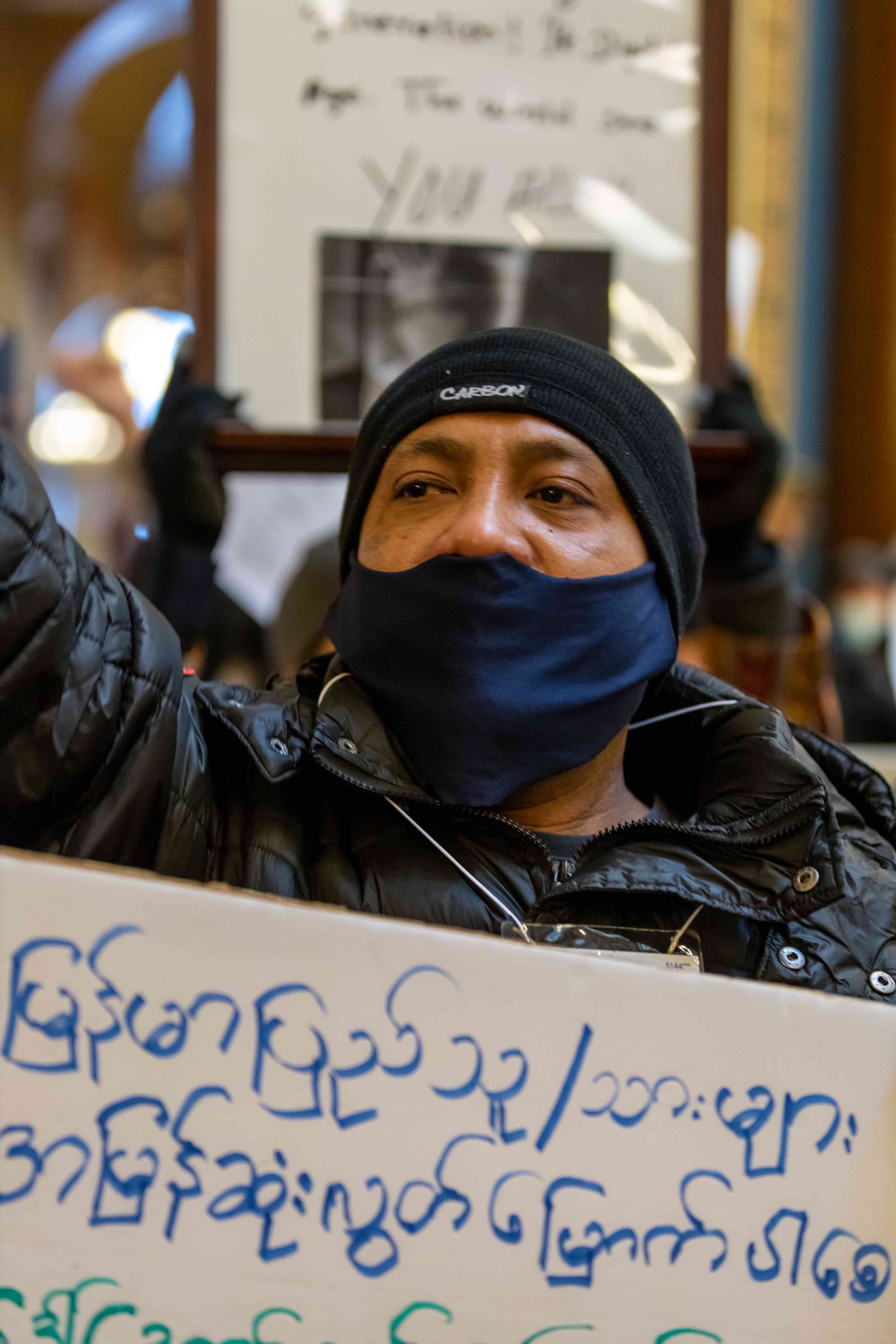Protestors rally for democracy in Myanmar
“We shall not surrender until the end of the world!”
So sang about 350 Burma community members and their allies at the Iowa State Capitol on Saturday, February 6th during the Protest for Myanmar, organized by EMBARC and Burma leaders in Iowa in response to the military coup in that country on February 1st.
The song “Kabar Makyay Bu” (We Won’t Be Satisfied till the End of the World), set to the tune of “Dust in the Wind” by Kansas, was written by composer Naing Myanmar during the 8888 Uprising 22 years ago. Since the recent coup, the Burmese song has become a rallying cry among pro-democracy activists in Myanmar and throughout the world.
Representing the Burma ethnic minorities living in Iowa, including the Kachin, Karenni, Karen, Chin, Min, Rakhine, Shan, and Bamar communities, the protestors in Des Moines called for the U.S. government and other world leaders to put pressure on the military junta in Myanmar, also known as Burma.
“We can’t sit here watching the people in Myanmar crying,” said Lian Thang, secretary of the Iowa Chin Community and a drafter at EFCO Corporation. ”We can’t sit here watching them suffering.”
Watch a Video with scenes from the protest
Democracy Interrupted
Before the coup, Thang felt optimistic about the direction his home country was heading. Although Myanmar has been under military rule since 1962, the country has recently made significant steps toward democracy, with parliamentary elections returning in 2011.
In the November 2020 elections, the National League for Democracy party won 83% of Parliament’s seats. But the military refused to accept those results. As the new Parliament prepared to approve the new government, the military arrested civilian leaders; shut down the Internet, social media platforms, and phone lines; and closed airports and banks across the country.
The military also arrested Aung San Suu Kyi—State Counsellor, leader of the National League of Democracy Party, and Nobel Peace Prize Winner—and charged her with illegally importing walkie-talkies.
Since the coup, hundreds of thousands of people in Myanmar have taken part in a civil disobedience movement to defend democracy and the results of the election. Across the globe, Burma refugees and immigrants have held rallies in support of their friends and neighbors back home, as Iowans did on February 6th.
“What’s happening in Burma is happening to us all. We will continue to fight to save and free Myanmar.”
In the Capitol Rotunda
At the Iowa State Capitol, community leaders organized both a passionate protest and a joyful celebration Burma culture and democracy. Protestors sang, danced, chanted, and waved signs and flags. They also symbolically stomped on photos of Min Aung Hlaing, the military leader who took power after the coup.
Many of the protestors wore red as a show of support for the National League of Democracy Party. Some donned traditional Burma clothing, while others displayed photos and artwork of Suu Kyi, calling her “our leader” and “our lady.”
Hundreds of signs in both Burmese and English reinforced the protestor’s message, including:
#SaveMyanmar
Shame on You, Dictator
You Messed with the Wrong Generation
There is a Time to be Silent and a Time to Speak
Freedom and Democracy are Dreams You Never Give Up
Please Use Your Liberty to Promote Ours
In a show of solidarity with the Burma community in Iowa, local leaders and community members spoke at the event, including Iowa State Senators Brad Zaun and Sarah Garriot, the Syrian Refugee Community in Iowa, and the Myanmar Burma Student Association from the University of Iowa.
“As Iowans, we stand shoulder to shoulder with you in your fight for justice,” said Robert Brownell, Polk County Supervisor.
But the most powerful words came from the Burma refugees themselves.
“We are here because we were tortured by the government. We live in fear every day in our county. We cannot stand it anymore. We have to fight.”
Demands for Democracy
Before the protest, the leaders of the Burma community put out a statement in opposition to the military coup with the following three demands:
We demand the immediate release of State Counselor Aung San Suu Kyi, President Win Myint, and other political leaders detained by the Burmese military.
We demand the Burmese military accept and honor the results of the November 2020 elections.
We demand that the Assembly of the Union, the legislature of Burma, be allowed to resume with those elected in 2020.
“Let the whole world hear our voice so they can take appropriate action against the Burma military,” said Thang.
History In the Making
Although they’ve lived under harsh military rule for nearly 60 years, the people of Myanmar have a long history of protest, including the 1962 student protests, the 8888 Uprising in 1988, the Saffron Revolution in 2007, and the current civil disobedience movement.
Min Tun, Lead for the Protest for Myanmar, said that this new movement is key to taking down the military. He participated in a student strike in his home country in 1994.
Promoting unity among the various Burma ethnic groups was a major theme of the demonstration at the Capitol. Throughout the hour-long event, protestors flashed the three-finger salute from “The Hunger Games” film franchise, a gesture that has spread across Southeast Asia in the past decade as a symbol of pro-democracy protest.
“We will surely get to our destination if we join hands,” said Min Tun. “We want all the people around here to hear our voice.”
Browse photos from the protest















